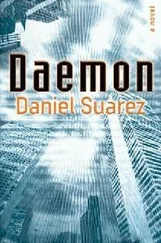Hedrick had suggested that this prison would change his mind, but this was simply banishment. Banishment to the Iron Age.
He laughed. Isn’t that what Richard Cotton’s group, the Winnowers, stood for—returning mankind to the Iron Age? Grady could become a member now.
He’d had way too much time to contemplate these things in the past few months. He kept turning them over and over in his head. Had he been wrong to tell the BTC to piss off? Not that he could lie to them, but what good was he doing by sitting on this rock for the remainder of his days? Surely that wasn’t going to slow them down or stop them one iota. And this way he couldn’t influence how they’d use his breakthrough. He wouldn’t have a seat at the table.
Grady felt defiance rise in him.
It was the principle. Wasn’t it? He knew he could not ethically assist the BTC in covering up fundamental discoveries that would advance mankind’s knowledge. The BTC’s simulations of progress-borne disaster had to be wrong—he felt it in his bones.
But what sort of assertion was that for a scientist to make? They had evidence. He had a “feeling.”
But he’d never seen their evidence, had he? It all seemed too convenient. They justified their domination of others—but who could say they were even being honest with themselves? Just look what they were willing to do in pursuit of their mission. Was Grady’s wasting away on this rock really a good use of brainpower?
And yet there were many historical precedents for this—periods when belligerent ignorance trumped reason.
During the Roman Inquisition, the Catholic Church had done something similar with Galileo—condemned him to imprisonment in his own home. To never publish again. The church wanted to suppress the spread of knowledge during the Enlightenment—to maintain its control. It went so far as to have church officials searching through the private libraries of dukes and other nobles, looking for passages in books that offended the church, literally crossing out ideas that violated church doctrine and scribbling official church doctrine in its place. Agents of the inquisition were stationed in ports to find seditious books coming in by sea. Grady couldn’t help but think that the church was, in a way, the BTC of the seventeenth century.
No. This situation wasn’t new. And Grady knew which side he needed to be on. The side of reason.
Grady’s manipulation of gravity would change civilization. But was that so bad? Change could be good. Of course the BTC wanted to stop change—they were currently in charge. And that’s what the church thought it was doing by preventing Galileo’s ideas from spreading. Preventing change.
But it didn’t work, did it? That gave Grady some measure of hope.
Okay, you’re comparing yourself with Galileo now.
Grady stared through the window at the darkening sea for untold minutes as thoughts rolled around in his mind. Was the BTC right about Grady’s ego? Was Grady really making this all about him? Was he an egomaniac?
Just then there was a knock on the cottage door.
Grady spun toward it. His heart raced as adrenaline coursed through him. It had been months. No one had ever knocked on his door. Were they coming for him again? He looked around uncertainly, but then resolve came over him.
Grady shook his head slowly. No. He would not give them the satisfaction of being afraid.
He approached the thick wooden door confidently and pulled it open by its wooden latch.
On the doorstep stood a slim humanoid robot, not unlike the one he’d seen in Hedrick’s office all those months ago. This one was surfaced in brushed-steel panels. It had glowing tourmaline eyes and no mouth. It was different enough from a human that no uncanny valley effect occurred—clearly a machine. It had an appealing design, like an upscale espresso machine. Obviously it was meant to seem friendly. Harmless.
The robot nodded to him and a vaguely familiar female voice spoke: “Good evening, Mr. Grady. I wanted to see how you were settling in.”
Grady stood aside and dramatically swept his arm. “Come on in. I’d offer you a drink, but…” He let his voice trail off.
The robot was inscrutable as it stepped gracefully inside. “Thank you.” It looked around. “I’m a person, you know. This is just a telepresence unit.”
“Telepresence. Nifty. You guys imprison the person who invented that, too?” Grady closed the door.
The robot managed a nonplussed look and moved through the room to gaze out the window at the ocean. “Do you remember me?”
“How could I forget? Alexa. You were more lifelike last time I saw you… but not by much.”
“I’m here on official BTC business.”
“You’re not here, actually. You’re just a walking phone. Anyone else in on this conference call?”
“Our conversation is being recorded for the file, yes. But then, everything is recorded for the file.”
“Well, for the file then: What the fuck do you want?”
“You look in good health. Have you been treated well?”
“Yeah. Fine. Just fine.” He snapped his fingers. “Although there was that rough patch when you guys”—Grady pounded his fist on the kitchen table—“STOLE EVERYTHING I CARED ABOUT!” A bowl and stoneware mug went flying and shattered on the floor.
The robot just stared at him.
“How do you think I’m being treated?”
The robot waited several moments. “Most of the innovators we harvest manage to find calm after a period of solitude. They use the time to reflect—on both what was lost and what can still be gained.”
“You have got to be joking.”
“As your BTC case officer, I came to offer you another chance to join us, Mr. Grady. Now that you’ve had a chance to reflect.”
“I see. So I’m supposed to just forget that you guys are deliberately keeping all of humanity in the Dark Ages. That you stole my life’s work. That you imprisoned me.”
The robot resumed its tour of the cottage. “All of that is a regrettable necessity, but we’ve been over this. Complaining about it won’t change anything.” The robot picked up one of Grady’s symphony parchments from the desk, turning it around.
“Put that down.”
“Does your synesthesia also make you musically gifted? Interesting…”
Grady moved toward her to grab the paper, but just then the sound of his own music filled the cottage. Violins. And a French horn. It played for a few seconds, then stopped.
The robot lowered the page. “Apparently not.”
“It’s a work in progress.” He grabbed it from her and collected all the other papers from the desk. “Why are you even bothering me? You don’t seriously expect me to forgive all this and join the BTC, do you?”
“Approximately seventeen percent of uncooperative innovators have a change of heart during the isolation phase.” The robot picked up a quartz rock from a shelf and retrieved the Omnia book from under it. The machine flipped through the book’s blank pages. “Most innovators work with the Omnia to learn more about the advances that we’ve made—to see how they might fit into the big picture.”
“You mean the advances that others have made. That you stole.”
“You still have the wrong impression of us. Everything we do is designed to protect the human race. The rich and the poor. The strong and the weak. To keep humanity from driving itself to extinction.”
“And I suppose if I’d spent all my time reading your redacted propaganda, I would have realized that by now. You’re never going to convince me the BTC has the best interests of humanity at heart. You’re like every tyrant throughout history.”
“We’re part of the U.S. government. Our legitimacy stems from—”
Читать дальше












